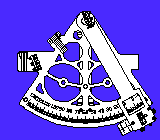5) Raw Materials
Brass
The majority of raw materials used within this sextant are brass of one sort or another.
For the main frame of the sextant, I have specified Compo Brass. This is a free machining variant used by engravers. As the graduations on the sextant are engraved, I chose the type preferred by engravers. In the UK, it's given the designation CZ121, which will be of no use to anyone sourcing it outside the UK whatsoever.. [Sorry!] Compo brass appears to be about 20% more expensive than normal brass.
If you wish to use aluminium, then go ahead. As far as I can tell 6082-T6 is stronger and it is certainly lighter than brass – but it will show local damage more easily and will need to be anodised for marine use. The best alloy for marine use is 5086 (won't need anodising except to keep it shiny), but I fear that you are unlikely to get it in small quantities. 5086 in the O condition is of similar strength to annealed brass, but it is softer, so will mark more easily. In the hardened (H8) condition it is still workable, is almost as strong as 6082-T6, and could be used.
If aluminium is OK for you, who am I to gainsay your choice? There are many very expensive aluminium sextants (the Astra IIIB, Tamaya Spica & Jupiter to name but three), so you'll be in good company. However, to maintain the accuracy of the sextant over a wide range of temperatures, please use the aluminium for as much of the sextant as you can. This way most of the self compensating temperature effects will be maintained.
Silver Steel
I have specified silver steel in a few places. In North America, the equivalent is called 'drill rod' – I don't know about elsewhere. For the micrometer shaft I have simply specified it because I think the strength and stiffness of steel is required, and didn't want to buy a stainless steel rod as it's not dual use (for reamers..). The use of brass in the vernier shaft would totally eliminate the biggest potential source to temperature induced errors in the sextant. You can experiment yourself at very little expense if you wish!
In the case of the locating pegs and shade pivots I specified silver steel as it has a close manufacturing tolerance (can be used with no further machining) and it can be soldered, while SS can't. Brass would be suitable here – but in the UK it isn't readily available in metric sizes.
Glass Shades.
Here I had no choice at all. I was limited by what was available, and I think you will be too. My shades (when they finally arrived after 6 weeks wait) turned out to be 2.5mm thick No. 3 welding shades, which meant that I only had room for two horizon shades without a slight redesign - not a great problem as many 'real' sextants only have two shades here too.
Timber.
You don't need timber at all. I just wanted to have a nice traditional hardwood handle. A turned brass handle would be good too – and softwood would be equally good.
Mirrors
The mirrors I have specified are stainless steel. If you can, try to get electro-polished stainless steel. This will save you a huge amount of time when it comes to polishing the mirrors as ordinary SS sheet has numerous tiny ripples making for a blurred image (been there, it took me 6 hours of polishing with a bench grinder to get an acceptable finish - not much fun!). If you can, choose a 316 type stainless steel. The type I bought was 304S11 (UK designation for a low carbon sheet), and it has a slightly less 'silvery' luster to the reflections than you get from 316 stainless. Not of vital importance, but worth trying to get.
If you wish to, you could use surface mirrored glass (to avoid refraction errors), or even a semi-transparent mirror for the horizon mirror. If you choose to get one of these, it will probably take some searching to find a source. I have to thank Redgie Joy for a link to http://www.sciplus.com/singleItem.cfm?terms=9528&cartLogFrom=Search where it appears that such mirrors may be available.
<-Previous....Next->
<-Introduction
